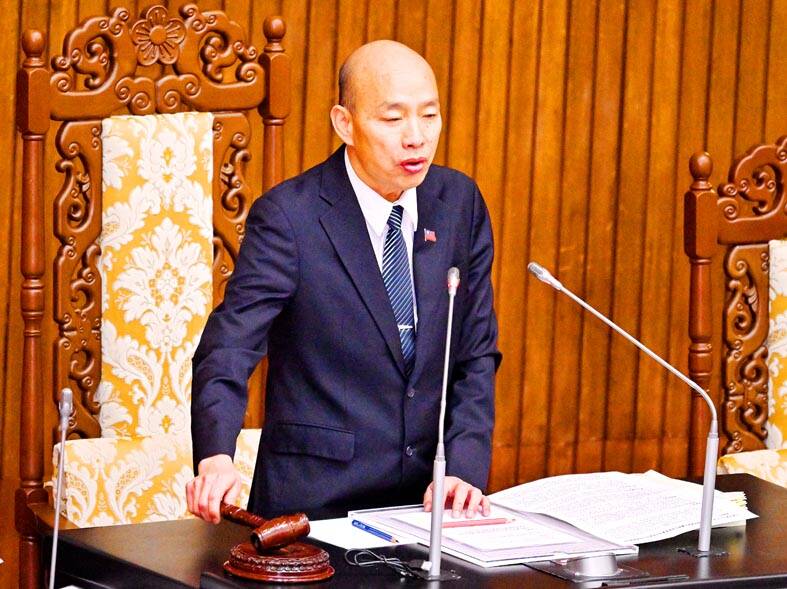The Legislative Yuan yesterday passed amendments to the Organization Act of the Council of Indigenous Peoples (原住民族委員會組織法) stipulating that the head of the Council of Indigenous Peoples would rotate between members of lowland and mountain indigenous groups while committee members from all indigenous groups would no longer be paid wages.
The amendments also state that two of the three deputy ministers must be from lowland and mountain indigenous groups.
The council should have between 19 and 29 members serving a term of two years, and they would be allowed to serve consecutive terms, the amendments say.

Photo: Liu Hsin-de, Taipei Times
The amendments also state that the positions would be unpaid.
The Council of Indigenous Peoples yesterday said the amendments severely undercut indigenous people’s rights, adding that it plans to contest the amendments or ask for the Constitutional Court for an interpretation.
The appointment of a minister to the council should be based on ability, and a policy forcing the rotation of such a position would prevent talented people from being selected, it said.
The amendments are at risk of legal overreach as they infringe on the premier’s right to appoint personnel, which contravenes Article 53 of the Constitution and Constitutional Interpretation No. 613, it added.
Democratic Progressive Party (DPP) Legislator Saidhai Tahovecahe (伍麗華) said that separating lowland and mountain indigenous groups was an antiquated relic of colonialism and that the amendment contravened the Constitution.
Chinese Nationalist Party (KMT) Legislator Sra Kacaw (鄭天財), one of the people who proposed the amendment, rebutted the accusation that the distinction was a relic of colonialism, citing how the distinction has been maintained by all iterations of the Local Government Act (地方制度法) throughout the years.
The amendment was a move to support indigenous peoples’ right to politics, he said.
Independent Legislator May Chin (高金素梅), co-author of the amendment, said that Saidhai Tahovecahe and others stood to benefit from the current system, adding that if every member of the council represented their people, 14 out of 16 would be DPP supporters.
Taiwan People’s Party (TPP) Legislator Chang Chi-kai (張啟楷) said that it was wrong for the DPP to place their supporters in the council and be paid by the state.

An essay competition jointly organized by a local writing society and a publisher affiliated with the Chinese Communist Party (CCP) might have contravened the Act Governing Relations Between the People of the Taiwan Area and the Mainland Area (臺灣地區與大陸地區人民關係條例), the Mainland Affairs Council (MAC) said on Thursday. “In this case, the partner organization is clearly an agency under the CCP’s Fujian Provincial Committee,” MAC Deputy Minister and spokesperson Liang Wen-chieh (梁文傑) said at a news briefing in Taipei. “It also involves bringing Taiwanese students to China with all-expenses-paid arrangements to attend award ceremonies and camps,” Liang said. Those two “characteristics” are typically sufficient

A magnitude 5.9 earthquake that struck about 33km off the coast of Hualien City was the "main shock" in a series of quakes in the area, with aftershocks expected over the next three days, the Central Weather Administration (CWA) said yesterday. Prior to the magnitude 5.9 quake shaking most of Taiwan at 6:53pm yesterday, six other earthquakes stronger than a magnitude of 4, starting with a magnitude 5.5 quake at 6:09pm, occurred in the area. CWA Seismological Center Director Wu Chien-fu (吳健富) confirmed that the quakes were all part of the same series and that the magnitude 5.5 temblor was

The brilliant blue waters, thick foliage and bucolic atmosphere on this seemingly idyllic archipelago deep in the Pacific Ocean belie the key role it now plays in a titanic geopolitical struggle. Palau is again on the front line as China, and the US and its allies prepare their forces in an intensifying contest for control over the Asia-Pacific region. The democratic nation of just 17,000 people hosts US-controlled airstrips and soon-to-be-completed radar installations that the US military describes as “critical” to monitoring vast swathes of water and airspace. It is also a key piece of the second island chain, a string of

The Central Weather Administration has issued a heat alert for southeastern Taiwan, warning of temperatures as high as 36°C today, while alerting some coastal areas of strong winds later in the day. Kaohsiung’s Neimen District (內門) and Pingtung County’s Neipu Township (內埔) are under an orange heat alert, which warns of temperatures as high as 36°C for three consecutive days, the CWA said, citing southwest winds. The heat would also extend to Tainan’s Nansi (楠西) and Yujing (玉井) districts, as well as Pingtung’s Gaoshu (高樹), Yanpu (鹽埔) and Majia (瑪家) townships, it said, forecasting highs of up to 36°C in those areas